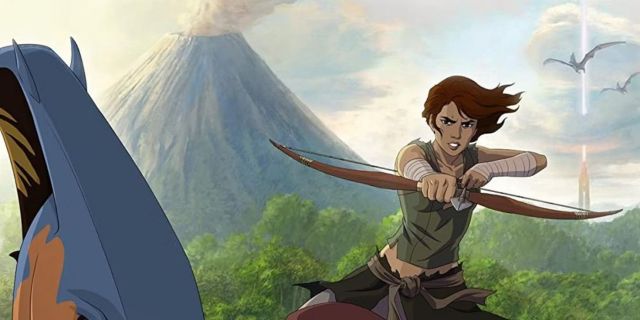Ark: Survival Evolved doesn’t seem like the first candidate for a video game adaptation. Most of the narrative emerges through discarded notes and snatches of flavor text. Fans tend to appreciate the dinosaur action and tolerate the written plot. Six episodes of Ark: The Animated Series dropped onto Paramount simultaneously, surprising and delighting fans. While the show isn’t groundbreaking, it remains compelling through its visual storytelling. Like Netflix’s Castlevania, it’s hard not to imagine how poorly the same story would play as a feature film.
Paramount Plus struggles to compete with its streaming competitors. The service boasts the Yellowstone cinematic universe, Nickelodeon’s cartoon catalog, and various blockbuster movies, but it recently picked a unique new direction. Paramount seemingly wants to become a home for video game adaptations. Its Halo show earned criticism from fans, but Parmaount also houses the well-received Sonic movies. With Ark, they double down on the questionable concept.
Ark works as an animated series
Ark: The Animated Series follows Helena Walker, a modern-day paleontologist who wakes up floating in a hostile sea. After evading several massive predators, she washes up on a mysterious tropical shore. The first thing she sees on her new home is a dodo. The encounter with a long-extinct animal excites her until she discovers a barely-clothed hunter chasing after it. Helena finds the people on the island almost as hostile as the animals, running afoul of a mad scientist and a Roman general. The island, dubbed the Ark by its inhabitants, houses humans and animals from the distant past. Helena discovers a talent for taming dinosaurs, including a parasaurolophus who becomes her mount and ally. The series depicts Helena meeting other survivors and discovering the truth behind the Ark while overcoming trauma and learning from her lost loved ones. Its narrative is straightforward, but its execution remains compelling. It owes its limited success to the action it depicts and its medium.
Castlevania provides a perfect example
When the first season of Castlevania dropped onto Netflix in 2017, it felt like a test run. Four well-produced episodes introduced Dracula, Trevor Belmont, Sypha Belnades, and Alucard. The season concluded with the promise of its heroes’ next adventure. It provided a runway for an excellent second season. Castlevania is one of the best video game adaptations ever made. The series captures every enjoyable element of the long-suffering franchise. Castlevania: Nocturne delved deeper into the concept, suggesting a future filled with new adaptations. Producer Adi Shankar returned to the video game well with his chaotic Captain Laserhawk: A Blood Dragon Remix, which played with Ubisoft’s catalog to great effect. Castlevania‘s test run proved the effectiveness of animated series as a medium for video game adaptations. It’s the answer to the “video game movie curse” that fans have always known about. The only problem is the ongoing mistreatment of animation as a concept.
Animated series make superior video game adaptations
Everyone has complained about the flood of terrible video game movies over the past few decades. Most live-action adaptations flopped hard. Look at The Super Mario Bros. Movie, Double Dragon, Lara Croft: Tomb Raider, or Assassin’s Creed. Recent examples tend to outperform expectations, but the lion’s share remains terrible. The “video game movie curse” has always been nonsense. Animated entries like Street Fighter II: The Animated Movie broke tradition and delivered excellent adaptations. Animated series like Mega Man and The Legend of Zelda often became iconic memories, even if they lacked the quality of feature-length entries. With shows like Castlevania, creators have found the perfect balance for future adaptations.
The only reason studios reach toward live-action adaptations is audience expectations. Despite their quality, Hollywood consistently looks down upon animated projects. Messy examples like Monster Hunter rely entirely on the shallow thrill of seeing video game creatures, props, and environments brought to life with mountains of cash. Animated adaptations like Castlevania might not deliver that feeling, but they capture the story and themes of their source material. Shows like Ark and Castlevania can elevate or expand a game’s narrative beyond the bounds of cutscenes and hidden notes.
Animated video game adaptations could quickly outpace their big-screen counterparts. While things like Halo struggle with every detail of their source material, Ark could become the finest exploration of its story. Animation provides a natural transition from the narratively difficult terrain of interactive media. While some examples will certainly fail, its success rate has been impressive so far. Stories like Castlevania and Ark would have struggled on the big screen. Every Hollywood adaptation introduces thousands of familiar issues that threaten to ruin beloved titles. Ark: The Animated Series won’t become anyone’s favorite show, but it might become the best introduction to the hit survival game ever produced.











Leave a Reply